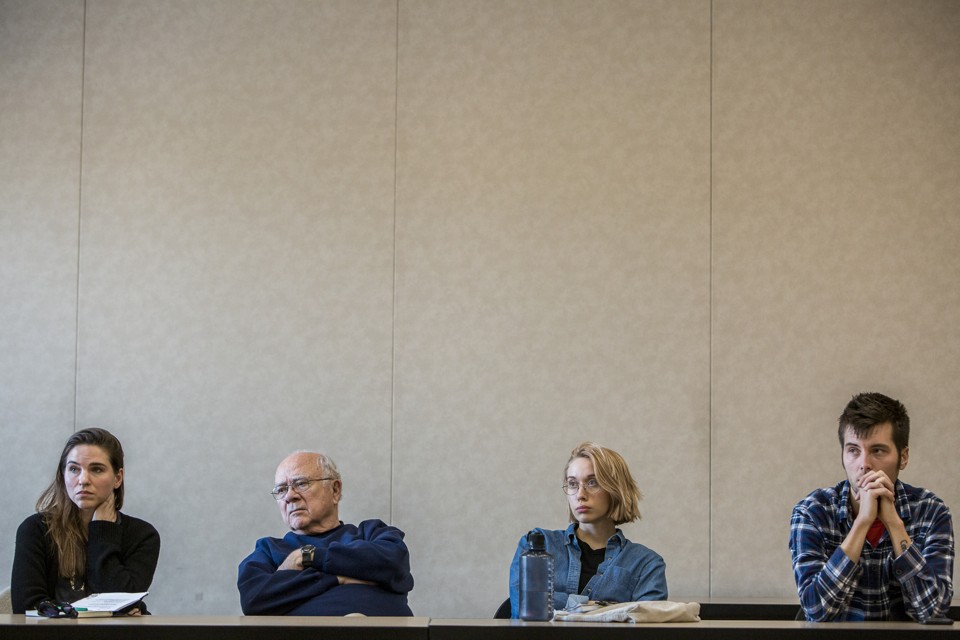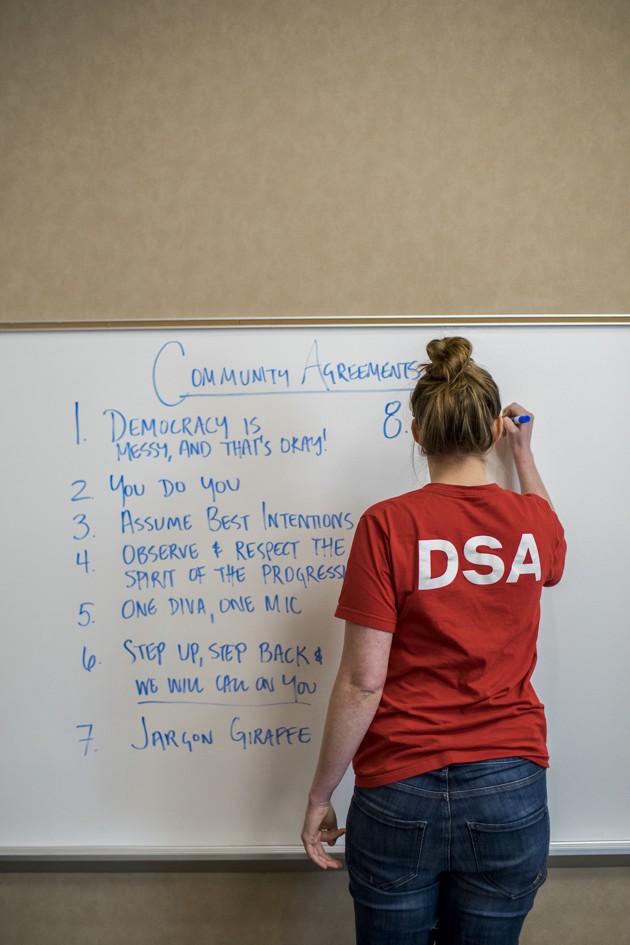Iowa’s Socialists Are Already Over 2020
DES MOINES—Caroline Schoonover has two immediate goals. One of them is to systematically dismantle capitalism. The other is to finish watching all seven seasons of Vanderpump Rules.
“There are a lot of things that are not funny to me when I’m thinking about the state the world is in, but there is something about Vanderpump Rules,” the 28-year-old told me, referring to the Bravo reality show that revolves around a wealthy British restaurateur and her employees. “It is just purely entertaining for me, in a way that is very low stakes.”
Schoonover, who grew up near Martensdale, Iowa, just south of the state capital, is one of the thousands of Millennials across the country who joined the Democratic Socialists of America after the 2016 election of Donald Trump. I met her one evening in mid-March during a visit to Iowa, my home state, right before she led a monthly chapter meeting. Schoonover is tall, blond, and ruddy-cheeked, with a goofy sense of humor that probably comes in handy during her day job teaching children about agriculture at a local museum. She’s finishing up her second year as the co-chair of the Central Iowa DSA, a position she sees as a way “to actually do something instead of being mad and upset every day after Trump became president.”
Iowa is a state that most Americans associate with straw polls and horse-race politics, and whose residents are generally thrilled to soak up the national-media spotlight every four years ahead of the caucuses. It isn’t, in other words, where most people would expect to find participants of a budding movement to overthrow the country’s political and economic system. One popular perception of socialism in America is that it’s a sort of pastime for affluent and cerebral hipsters. A recent article from New York magazine described the DSA as feeling like a “never-ending Brown University reunion,” where “extremely online” people attend mixers and try to date each other.

But Schoonover and the other socialists I met in Iowa are not Upper West Siders from moneyed families, nor are they, for the most part, graduates of elite Ivy League schools. They are very much online, but they aren’t members of the left-wing Twitterati—the well-connected media types who frequent secret happy hours where they are wooed by 2020 presidential contenders. Socialism, to them, is not a trendy niche hobby or an intellectual exercise for the political-theory obsessed.
Instead, the people I spoke with see the DSA as a vehicle for changing their own immediate circumstances. They want to build a movement that transcends individual politicians, whose positions are malleable and whose tenure is temporary. And while most establishment Democrats would like to distance themselves from the label, the trajectory of America’s newly surging socialist movement could ultimately shape the party’s future.
Schoonover’s chapter, which has about 160 members, didn’t exist before 2016—none of Iowa’s DSA groups did. In the more than two years since the presidential election, membership in the organization around the country has grown dramatically—from 6,000 to 56,000—and chapters have formed across the heartland. Iowa now has five throughout the state, and at least two smaller ones being founded. Recent polling shows that a majority of the likely Democratic caucus-goers in Iowa, 56 percent, say they would be happy to vote for a president who leans toward socialism. In February, Axios reported that several of the more moderate presidential candidates are worried about running because of the Democratic electorate’s leftward shift; one unnamed candidate’s own internal polling shows that in Iowa, socialism is viewed more positively than capitalism.
A key problem with these surveys, however, is that it’s still unclear what people think socialism means. Even the national DSA organization doesn’t have a set definition. “We have various definitions,” a spokesperson told me. “We’re a big-tent organization.” Under the DSA umbrella, one can expect to find all types of political philosophies, including Marxists, Leninists, communists, and even libertarian socialists. Socialism is a loaded term, full of history and dripping with stigma, for many Americans; the word hearkens back to Soviet Russia and conjures grim images of street riots and bread lines. That’s an impression Republicans are promoting ahead of the 2020 elections, as “socialist” has become Trump’s new insult of choice for Democrats in recent weeks.
But for the card-carrying Democratic Socialists I met in Iowa, those old stigmas hold no power.
Socialism, to them, means a fairer world—one where every person is born with a guaranteed right to things like health care and education; it looks like France’s crèche child-care system, or Sweden’s comprehensive welfare programs. “For me, it means de-commodifying most things, and especially decommodifying things people need,” explained Alex Loehrer, the 32-year-old co-chair of the Iowa City DSA, which has roughly 100 members.
It was a chilly Sunday morning in March, and Loehrer was seated at the head of a long table in a meeting room at the Iowa City Public Library. She was surrounded by 10 other chapter members, who took turns offering their interpretation of socialism between sips of Dunkin’ Donuts coffee. It’s all about allowing people “to control their access to their basic needs,” said Denise Cheeseman, a 20-year-old University of Iowa graduate student with a blond pixie cut. Ryan Hall, an undergraduate student at the university and the chapter’s other co-chair, said that the key word for him in the DSA’s title is democratic: “We really are pushing for an egalitarian ownership over our economy, over our well-being, over our decision-making processes.”
All the members at the meeting had their own reasons for joining the DSA, but most of those reasons were rooted in personal financial struggle: They were drowning in an ocean of student debt, or straining to pay their rent or afford their insurance premiums. David Sterling, who identifies as gender fluid and uses they/them pronouns, works as a cashier in the city’s public-parking division. Sterling, 26, grew up in Iowa City, but has had to move farther out of town to escape the creeping rent. And they weren’t able to afford the cost of tuition at the University of Iowa after graduating high school. “I’ve dreamed about going to the university in my hometown [for] most of my life,” Sterling said. “How sad is that?”
DSA members like Sterling have concluded that the cause of their financial woes is capitalism—and that the solution is to replace it with something else. For now, members of the chapter said that they are happy to fight for more immediate reforms, such as Medicare for all, a higher minimum wage, and stronger union rights. But ultimately, they see these policies as insufficient. “Capitalism is international,” said 34-year-old Rob Shaw, Loehrer’s husband and the chapter’s social-media manager. “Domestic reforms to a system that is international aren’t going to cut it.”
The magnitude of their project is something the members across the state have been reckoning with—do they first try to take on systemic racism, or health care, or money in politics? For efficiency’s sake, all the DSA chapters in Iowa have agreed to focus primarily on housing, which means informing renters about their rights and setting up local tenants’ unions. Chapters have already established renters’ unions in Ames and Dubuque, two of the state’s mid-sized cities. The choice makes sense. Iowa City was recently ranked as the most expensive place to live in Iowa, and Millennials, on their way to becoming the largest age group in the U.S., are much more likely to rent than own their homes compared with previous generations, reports a recent study from the Urban Institute. Two reasons for this contrast, according to the people surveyed, are climbing rents and high student-loan debt.

After the library meeting, the Iowa City socialists spent two hours marching between duplexes and apartment buildings in the southeast part of town, gathering signatures for the union. The people they spoke with were eager to share their stories of negligent property managers, and almost every tenant signed up for more information on how to join. We stopped at a boardinghouse to visit with one middle-aged woman who had recently begun to attend DSA meetings. She explained that her landlord planned to evict all the tenants rather than make necessary repairs to the building, and she wanted to find a way to fight back. A week before our visit, she didn’t know what democratic socialism even was. This, chapter members told me, is exactly the movement they’re trying to build.
“You don’t have to understand theory to understand Marxism,” as Schoonover, the Central Iowa co-chair, put it to me later in an interview. “You know that your boss takes advantage of you, that your landlord takes advantage of you. You know that you’re in debt, you know that you pay too much for health care. You don’t need to sit around and talk with a bunch of snobs about that to understand it.”
For the first few hours of my visit to Des Moines, I sat in a folding chair and watched the Central Iowa socialists participate in a refresher course on “bird-dogging,” the hunting-inspired term for assertively eliciting comment from a politician—similar to how reporters interrogate lawmakers in the halls of Congress. The socialists I spoke with aren’t excited, per se, about the 2020 presidential campaign beyond the possibility of defeating Trump, and many don’t plan to caucus, calling the state’s primary system undemocratic. But they are preparing to confront the candidates at events around the state. At the training, chapter members practiced framing and asking succinct questions, rehearsed the art of rapid hand-raising during candidate Q&As, and learned where and how to corner politicians after campaign stops. The chapter recently challenged Michael Bloomberg, the former New York City mayor who had considered a presidential bid, about his environmental record during his tour of the state. And they’ve already set their sights on a few other 2020 targets, including Senator Kamala Harris, the California prosecutor turned lawmaker whom Schoonover describes simply as “a cop.”
[Read: Kamala Harris’s show of strength]
The DSA members I met are frequent critics of many prominent Democrats, including—and maybe especially—some of the party’s most beloved icons. Former President Barack Obama, for example, is “complicit in American imperialism,” one told me. Ex-Representative Beto O’Rourke and his broad platitudes represent “everything that is wrong with the political systems of power in the United States.”
So it was frustrating for many of them in March when the DSA’s governing body formally voted to endorse Sanders for president. Sanders, who identifies as a democratic socialist, helped open Iowans’ eyes to the political possibilities of the movement with his 2016 campaign, but Schoonover and other members of the Central Iowa chapter still have issues with the senator from Vermont. For example, he hasn’t publicly backed any measures for reparations for black Americans, and he doesn’t support the boycott, divestment, and sanctions movement, a campaign advocating financial separation between the United States and Israel.
But more important, they say, working on behalf of a single candidate will only distract from their efforts to organize tenants and build power in their communities. “We don’t talk about Bernie,” Schoonover explained. “He’s not a factor in our organizing at all.” Most of them would certainly prefer Sanders to other Democrats in the 2020 field, and individual members can volunteer for him on their own time, Schoonover said. “But we’re not a Bernie Sanders fan club just waiting for our chance to finally knock doors for him.”

The DSAers in Iowa really have only one goal ahead of the 2020 presidential election: Move the conversation to the left in the first state that gets to winnow the Democratic field.
This is, of course, the opposite of what many Democratic Party leaders want. Many of them are desperate to distance themselves from any association with socialism, worried that it will scare off the party’s more moderate voters. It’s important, they say, not to mistake the growing popularity of policy ideas that can be described as socialist for the spread of full-blown socialism. House Speaker Nancy Pelosi, for example, practically leapt to her feet to applaud when the president vowed that America “will never be a socialist country” during his February State of the Union address. And multiple 2020 candidates have rejected the label, including progressive Senator Elizabeth Warren of Massachusetts, who recently called herself “capitalist to my bones.”
[Read: Elizabeth Warren’s theory of capitalism]
When I asked Troy Price, the Iowa Democratic Party chairman, how he would describe the left’s trajectory in his state, he paused. “I hate to use the word socialist,” Price said, suggesting that instead, “there is a more organized effort” to push the government “to help solve the biggest issues facing us right now.” Price further dismissed the idea that the DSA has any particular prominence in Iowa: “There’s been a rise of all sorts of different organized groups that have come up since the 2016 election. DSA is definitely one of them.”
Cathy Glasson, a nurse and the president of SEIU Local 199, was the most progressive candidate in recent history to run in an Iowa gubernatorial election, in 2018. But she doesn’t identify as a democratic socialist, and she doesn’t see Iowa moving in that direction. “I’m not sure it’s socialism we’re seeing,” Glasson told me. It’s just that “there is a tremendous eagerness” in Iowa for “bold, progressive ideas.”
But the DSA members I spoke with would contend that, at least in the short term, they are fighting for the same policy goals as progressive Democrats like Glasson. They want to expand union rights, pass Medicare for all, increase the minimum wage, and address climate change, just as she does—and just as leading 2020 presidential candidates do.
And like Glasson, the socialists, too, see an increased appetite for these ideas. It’s well established that Trump’s election served as a kind of wake-up call for Democrats. His ascendance, an affront to the sensibilities of liberals across the country, spurred a lot of them to join grassroots organizing groups or campaign for a candidate, many for the first time in their life. But it has also made admissible some ideas that were once on the fringe of public discourse. Confronted with what they perceive as the Trump administration’s radical agenda, people are now more willing to embrace radical solutions.
“There’s actually a really great quote by Lenin that says, ‘You have to be as extreme as the reality you confront,’” Casey Erixon, a 27-year-old DSA member, said one night at a bar on Ingersoll Avenue in Des Moines. (The exact quote from the Russian revolutionary: “One must always try to be as radical as reality itself.”) We were at a social for socialists: Schoonover was there, along with several other members of her Des Moines–based chapter, all hunkered over beers and discussing their last meeting. Erixon, who grew up just outside Crescent, Iowa, had worked on Obama’s reelection campaign in 2012. He’d always liked Obama, he said, and assumed that the former president’s “incrementalist” approach to progress was the right one. But after Trump’s win two and a half years ago, Erixon gave up on establishment politics.
“There is a growing sense that the system is broken,” he told me. From across the table, another DSA member, 28-year-old Blake Iverson, interjected—if he’d admitted to being a socialist a few years ago, people would have been dismayed, he said. Now “it’s like, Okay, that’s a normal part of the political landscape. That’s a normal position to hold.”
This is what frustrates them both about socialism’s reputation, in some circles, as a sort of elite club for bookish rich kids. Erixon didn’t graduate from college, and he works as a career coach for people with disabilities. Iverson, too, dropped out of school, and now makes $13 an hour as a teacher’s aide. “I’ve been to Brooklyn, Iowa, more than I’ve been to Brooklyn, New York,” he said with a chuckle. It just goes to show, they told me, that the socialist movement is for everyone.
With less than a year until the caucuses, and more than a dozen Democrats officially in the mix, Iowa is overrun with candidates, who are popping up in schools and workplaces and balancing on countertops at their local coffee shops. But while in-state Democrats are focused on the present—attending candidate meet and greets to suss out which Democratic contender is most likely to beat Trump—the Democratic Socialists of Iowa have their sights set on something much bigger. Something they will be working toward well past the 2020 election.
“We are facing, as a city and as a state and country, systemic problems that require solutions all across the board,” Rob Shaw told the Iowa City chapter members before they embarked on their door-knocking mission. “The only way we’re going to do that is if we actually organize a base that can respond to more than one problem.”
“What do these problems stem from?” asked Alex Loehrer, the co-chair, from across the table. “Do you want to say it for the record?”
“Fuck capitalism,” Shaw replied with a smile. The chapter members cheered.


 Elon Musk’s Shadowy Alliance with Vladimir Putin: A National Security Threat
Elon Musk’s Shadowy Alliance with Vladimir Putin: A National Security Threat  The Unconventional Diplomatic Dynamics Shaping Global Relations: Trump, Musk, and Covert Negotiations
The Unconventional Diplomatic Dynamics Shaping Global Relations: Trump, Musk, and Covert Negotiations  Ethicoin’s Role in Shaping the Future of the Federal Reserve System’s U.S. Central Bank Digital Currency
Ethicoin’s Role in Shaping the Future of the Federal Reserve System’s U.S. Central Bank Digital Currency  Record Volumes of Russian LNG Replace Pipeline Gas in Europe
Record Volumes of Russian LNG Replace Pipeline Gas in Europe